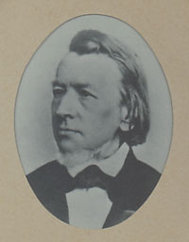Carl Friedrich Rheinwald
Carl Friedrich Rheinwald (born February 13, 1802 in Stuttgart , † February 19, 1876 in Rottweil ) was a German lawyer and democratic politician .
Life
The father was a businessman. After graduating from school, Rheinwald studied law in Tübingen. Since 1820 he belonged to the boys' association and the Germania Tübingen fraternity . Between 1824 and 1826 he worked as a court actuary in Ulm , Ravensburg and Oberndorf am Neckar . After that he was legal counsel in Rottweil until 1834. He married in 1827.
In 1832 Rheinwald took part in the Hambach Festival . In 1833 criminal proceedings were initiated against him. The reason was a speech given at a people's meeting in Spaichingen . Rheinwald was sentenced to six months of imprisonment for dangerous agitation and lese majesty. He served his sentence at Hohenasperg fortress . A year later there was a new investigation into suspicion of membership in a secret revolutionary association. Rheinwald fled to Switzerland . In 1835 he was entered on the list of fugitive criminals in the Kingdom of Württemberg and removed from the list of lawyers. He was not given an amnesty until 1842.
Between 1834 and 1836 he was secretary of the endowment committee in Bern and then until 1837 subordinate commissioner. He received his doctorate in 1836. jur. From 1836 he was an associate professor for Germanic law at the University of Bern . Since 1843 he was also the provisional holder of the chair for Bern civil law and civil litigation. Rheinwald was dean of the university in 1844 and rector in 1847.
In May 1848 he was elected to the Frankfurt National Assembly for the Spaichingen constituency. The authorities in Bern denied him leave to exercise his mandate. Legal proceedings were initiated against him for allegedly un-republican convictions. However, the release was rejected by several courts. Instead, he voluntarily resigned from his professorship.
In parliament he belonged to the left parliamentary groups Deutscher Hof and Nürnberger Hof as well as the Central March Association . At times he was a member of the drafting committee for the minutes and in the committee for appraising and reporting on the submission by the Reich Ministry on Austria's relationship to the formation of a federal state of the German states. He voted against the election of Friedrich Wilhelm IV as Emperor of the Germans.
Between 1849 and 1850 he was a member of the constitution-revising state assembly of the Kingdom of Württemberg. From 1849 until his death he was legal counsel in Rottweil. He was involved in the construction of the Black Forest Railway and a telegraph line. In 1859 he was co-founder and chairman of the trade association in Rottweil. In 1862 he was a co-founder and director of the local craft bank.
literature
Frank Raberg : Biographical handbook of the Württemberg state parliament members 1815-1933 . On behalf of the Commission for Historical Regional Studies in Baden-Württemberg. Kohlhammer, Stuttgart 2001, ISBN 3-17-016604-2 , p. 722 .
Web links
- Carl Friedrich Rheinwald . In: Heinrich Best : The members of the Frankfurt National Assembly 1848/1849 (BIORAB-FRANKFURT) (the exact data set must be found).
Individual evidence
- ^ Helge Dvorak: Biographical Lexicon of the German Burschenschaft. Volume I: Politicians. Sub-Volume 5: R – S. Winter, Heidelberg 2002, ISBN 3-8253-1256-9 , pp. 60-62.
| personal data | |
|---|---|
| SURNAME | Rheinwald, Carl Friedrich |
| BRIEF DESCRIPTION | German lawyer and politician |
| DATE OF BIRTH | February 13, 1802 |
| PLACE OF BIRTH | Stuttgart |
| DATE OF DEATH | February 19, 1876 |
| Place of death | Rottweil |
